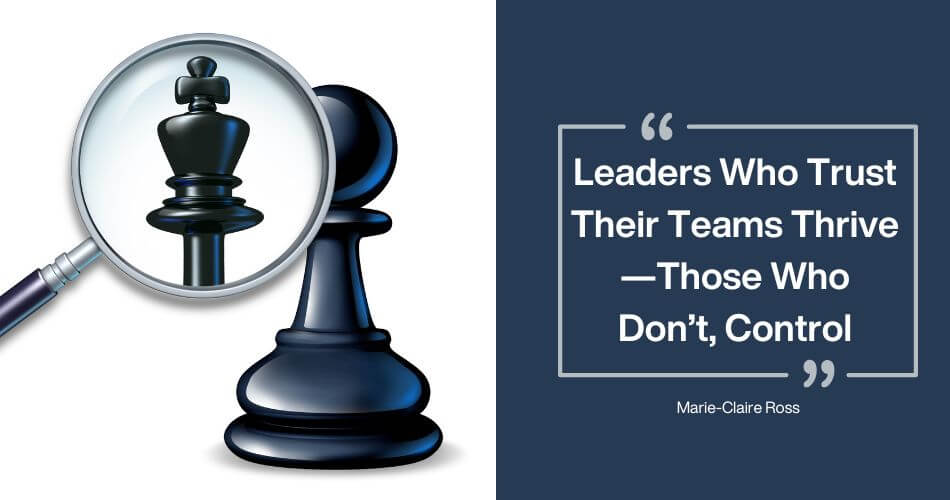Empowering Leadership vs. Control Freaks
Discover how empowering leadership fosters growth and trust while control stifles creativity.

The Role of Leadership in Empowering Teams
Imagine a new estate agent, bright-eyed and full of ambition, stepping into the world of property sales. Under one manager, they are constantly watched, given little freedom, and second-guessed at every turn.
In another office, they find a mentor who believes in their potential, offers guidance when needed, but ultimately trusts them to get the job done. Which environment do you think encourages success?
Leadership plays a defining role in shaping the dynamics of any team. When leaders believe in their people, empowering them to take initiative, they unlock innovation and motivation.
On the other hand, leaders who don’t trust their teams often become control freaks, creating a stifling environment that limits creativity and discourages growth.
In this article, we’ll explore the contrast between control freak leadership and empowering leadership, providing insights and tips for fostering a healthier, more effective workplace.
Understanding Control Freaks in Leadership

What Is a Control Freak Leader?
A control freak in leadership is someone who feels compelled to oversee every minor detail of their team’s work.
They fear failure and doubt the competence of their team members, believing that only they can ensure a project’s success. This micromanagement often stems from deep-seated anxieties about letting go of control and trusting others.
Key Traits of a Control Freak Leader:
Micromanagement: They oversee every small task, leaving little room for autonomy.
High Expectations: Often, their standards are unrealistically high, based on personal perfectionism rather than recognizing team strengths.
Lack of Trust: They frequently believe their team cannot meet their expectations, leading to unnecessary oversight.
Fear of Failure: Past experiences with failure often fuel their controlling tendencies, making them unwilling to delegate critical responsibilities.
The Impact of Micromanagement on Team Morale
Micromanaging drains the energy and creativity from any team. Team members start to feel more like robots following instructions than professionals making meaningful contributions.
This leads to frustration, as their potential remains untapped. Over time, morale plummets, innovation halts, and employees either disengage or leave in search of more fulfilling work environments.
The Negative Impact of Control Freak Leaders

How Control Stifles Creativity and Engagement
When leaders try to control every detail, they inadvertently suppress creativity. Employees feel discouraged from taking risks or offering innovative solutions, knowing their suggestions might be shut down.
Over time, they become passive participants, focusing on doing the minimum to avoid conflict.
Case Study: A Disengaged Team
Take the example of a real estate office in Cape Town. A once high-performing team became demotivated under a controlling manager who scrutinized every decision.
Talented agents began to withhold ideas and eventually moved to other agencies. The firm’s success declined because the team no longer felt empowered to excel.
High Expectations Without Trust
Control freaks often hold their team members to impossibly high standards, but without giving them the trust or autonomy to meet those expectations. This creates a toxic dynamic where employees feel set up to fail.
Empowering Leadership: A Better Approach
What Is Empowering Leadership?
Empowering leadership is rooted in trust, delegation, and belief in the potential of others. These leaders recognize that their role is to support, not stifle, their teams.
They encourage autonomy, allowing team members to take ownership of their work, make mistakes, and learn.
Key Aspects of Empowering Leadership:
Trust and Delegation: Empowering leaders to delegate responsibility, trusting their teams to get the job done without constant oversight.
Encouragement and Support: They provide the necessary guidance but allow space for employees to explore solutions on their own.
Fostering a Growth Mindset: These leaders see failure as a learning opportunity, encouraging innovation and personal growth.
Building a Growth Mindset Through Belief
Empowering leaders foster a growth mindset by believing in their team’s ability to improve and innovate. They see mistakes as part of the journey toward mastery, helping team members build confidence through both success and failure.
Competence vs. Empowerment: A Leadership Paradox

The Dangers of Competence Without Trust
It’s a paradox: leaders who are highly competent themselves often struggle to trust others. They may feel that their expertise is essential to every decision, leading them to micromanage.
While their knowledge is valuable, it becomes detrimental when they refuse to empower their teams.
Consequences of This Mindset:
Micromanagement: Competent leaders who don’t trust their teams tend to overstep, resulting in inefficiency and burnout.
Failure to Delegate: By refusing to delegate, these leaders miss opportunities for team members to grow and contribute meaningfully.
The Impact on Team Dynamics
Leaders who don’t believe in their team’s potential create an environment where team members feel undervalued. This leads to decreased motivation and engagement, with talented individuals eventually seeking opportunities elsewhere.
Creating a Collaborative Culture
How Belief in Others Fosters Innovation
Leaders who believe in their team’s abilities foster an open environment where ideas are shared freely, and collaboration thrives.
When employees feel trusted, they are more likely to take initiative, offer creative solutions, and contribute to the team’s success.
Encouraging Personal Growth and Confidence
By delegating tasks and trusting their teams, empowering leaders give individuals the chance to grow. This confidence-building approach helps employees feel more capable and engaged, leading to higher productivity and job satisfaction.
Long-Term Benefits of Empowering Leadership

Higher Morale and Lower Turnover Rates
A culture of trust and empowerment leads to happier employees who feel valued and motivated. This not only improves morale but also reduces turnover rates. Companies with empowering leaders often retain top talent, resulting in long-term success.
Organizational Adaptability Through Trust
In a rapidly changing business environment, adaptability is key. Empowering leaders help their teams develop the skills and confidence needed to navigate challenges, making their organizations more resilient and better equipped for the future.
The Transformative Power of Belief in Leadership
Leaders who truly believe in their teams unlock a powerful dynamic—one where creativity, growth, and collaboration thrive. Empowering leadership doesn’t just guide a team; it elevates it, fostering an environment where individuals feel valued, confident, and driven to contribute their best.
In contrast, control freaks may achieve short-term results, but they ultimately suffocate innovation, erode morale, and limit the potential for long-term success.
True leadership is about trust—knowing that your belief in others will spark their potential and ignite a ripple effect of success across the organization.
When leaders step back and allow their teams to shine, they don’t just manage—they inspire. And when inspiration takes root, growth becomes unstoppable.
Believe in your people, and watch them transform challenges into opportunities, hesitation into bold decisions, and teamwork into excellence.
Empowerment is not just a leadership tactic—it’s the foundation of a thriving, resilient, and successful organization.
Your belief in others can be the very catalyst that transforms not only your team but your entire vision into a reality. Lead with trust, and the rewards will follow.
This article was inspired by Andre Swart, a dedicated real estate leader with over 20 years of experience. Andre’s commitment to empowering his team and fostering a culture of trust and collaboration has been the cornerstone of his success.
His leadership style serves as a reminder that believing in people is not just a strategy, but a path to unlocking true potential and achieving lasting success.
